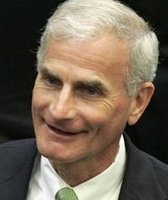Get PolitiFact in your inbox.
Tom Scott says a 2005 vote against gay pride events didn't involve discrimination
With two seemingly divergent votes on gay rights, Tampa mayoral candidate Tom Scott is facing heat from both liberals and conservatives.
Gay rights groups lambaste Scott for his 2005 vote as a Hillsborough County commissioner to ban the county from acknowledging or promoting gay pride events. Conservative groups condemn the city councilman for voting in 2009 to add transgender protection to Tampa’s human rights ordinance.
Asked about the apparent contradiction during the St. Petersburg Times-Bay News 9 debate on Feb. 8, 2011, Scott said the 2005 vote "had nothing to do with discrimination. I oppose any kind of discrimination in any form."
We asked him again on Feb. 11 about the vote. "The issue was spending public dollars to advocate or advertise gay pride," he said.
Scott is trying to make a distinction between issues like housing or employment discrimination and support for gay pride events. He highlights his recent vote and says he wants to be a mayor who represents everyone.
We wanted to dig deeper into Hillborough's policy. Does it have anything to do with discrimination?
It began in 2005 when then-County Commissioner Ronda Storms saw a display at a county library promoting Gay Pride month. Storms, who is now a state senator, worried about passing the display with her kids and having to explain it to them.
On June 15, 2005, Storms made the following motion at a county commission meeting: "I move that we adopt a policy that Hillsborough County government abstain from acknowledging, promoting or participating in gay pride recognition and events, little g, little p."
Scott seconded the motion. It passed 5-1. Storms followed up with a second proposal that the policy can only be rescinded with a super-majority vote and a public hearing.
The lone 'no' vote came from Kathy Castor, now a Democratic congresswoman. During the brief discussion of the proposal, she said, "I think it's inappropriate for government to promote discrimination."
We asked Nadine Smith, director of the gay rights group Equality Florida, if she thought the policy has anything to do with discrimination.
"The vote in 2005 was simple, mean-spirited bigotry," she said. "It was indefensible."
She added: "Were he to ask for my advice, I would tell him you should just apologize for what they did. Say, 'What we did was wrong. We singled out one class of citizens to be treated differently.'"
County Attorney Renee Lee interprets the policy as banning county funds from going to gay pride events. Participation as a board is also prohibited, though individual commissioners can do as they like. The policy also means the board cannot acknowledge a gay pride event with a resolution or proclamation.
"We have not had any recent instances where the board has had to invoke the use of that policy," Lee said.
Lee deferred to Scott when asked if the policy was discriminatory.
Hillsborough's refusal to support gay pride events is not legal discrimination. Federal and state laws prohibit unfair treatment in housing, employment and public accommodations based on a person's race, national origin, religion, gender, disability, age or martial status.
Neither federal nor Florida anti-discrimination laws include a sexual orientation provision.
The gay pride policy was challenged in federal court by strip club owner Joe Redner. The two sides settled in 2007, agreeing to update the policy so it shall not "be construed to prevent citizens from exercising their First Amendment rights in an appropriate forum."
So the policy is unquestionably legal. But does it involve discrimination?
Let's check out a few definitions:
The Florida Commission on Human Relations: "The unfair treatment of a person or group on the basis of prejudice and without regard to individual merit."
Webster's New World Dictionary: "A showing of partiality or prejudice in treatment; specifically action or policies directed against the welfare of minority groups."
The federal Equal Employment Opportunity Commission says discrimination involves treating someone "unfavorably" because they are a member of a protected class of people. (Once again, federal law doesn't include gay people as a protected class.)
Basically, it's differential treatment of a person or group — not based on merit but because the person belongs to that group.
Hillsborough County issues scores of resolutions each year lauding groups and community leaders. It also supports several so-called "pride" events each year. A 2006 county newsletter reads in part, "Every year, Hillsborough County helps recognize Hispanic Heritage month…" The county is also listed as the top partner of the upcoming Asia Fest 2011.
The county in 2007 issued a proclamation honoring the bicentennial birthday of Confederate commander Robert E. Lee. But the 2005 policy precludes the county from issuing a similar commendation of a gay pride event.
"The difference would be you're talking about a race or culture versus a sexual orientation," Scott said. He noted the county doesn't promote heterosexual pride events.
Added Tampa family values activist David Caton: "Being Hispanic is not a changeable position. There are, however, people who have left the homosexual lifestyle. There’s a huge difference in recognizing a group of people based upon their lifestyle."
Whether homosexuality is a lifestyle choice is, itself, also a topic of continuing debate. In an online fact sheet, the American Psychological Association says, "no findings have emerged that permit scientists to conclude that sexual orientation is determined by any particular factor or factors. Many think that nature and nurture both play complex roles; most people experience little or no sense of choice about their sexual orientation."
We understand gay rights is a tough political issue. It touches on religious and cultural beliefs that run the gamut from liberal to conservative to somewhere in between. Reasonable people have legitimate disagreements on the topic.
Regarding the 2005 vote, many parents were uncomfortable with a gay-themed book display in a public library. Many people think the vote is good public policy. According to federal and state laws, the policy is not discrimination.
But Scott is wrong in casting the 2005 issue as being just about "spending public dollars" and "had nothing to do with discrimination." The county won't even recognize gay pride with a resolution or proclamation as it does for other groups. The policy does involve discrimination. A group of people is treated differently. They aren't treated differently because of individual merit. They're treated differently because they belong to that group.
We rate Scott's statement False.
Featured Fact-check
Our Sources
St. Petersburg Times-Bay News 9, "A Conversation with the candidates," Feb. 8, 2011.
Interview with mayoral candidate Tom Scott, Feb. 11, 2011.
Interview with Equality Florida director Nadine Smith, Feb. 11, 2011.
Interview with Florida Family Association director David Caton, Feb. 11, 2011.
Interview with Hillsborough County attorney Renee Lee, Feb. 11, 2011.
St. Petersburg Times, "Hillsborough bans county from recognizing gay pride," June 16, 2005.
St. Petersburg Times, "Irony of honors evokes a protest," Jan. 19, 2007.
St. Petersburg Times, "County votes to lessen tax bite," Jan. 5, 2007.
Hillsborough County Newsline, "Hispanic Heritage Celebration Pays Special Tribute to Employees," October 2006.
Asia Fest 2011, "partners."
Florida Commission on Human Relations, definition of discrimination.
U.S. Equal Employment Opportunity Commission, "Discrimination by type."
American Psychological Association, Sexual Orientation and Homosexuality.
Browse the Truth-O-Meter
More by Lee Logan
Tom Scott says a 2005 vote against gay pride events didn't involve discrimination
Support independent fact-checking.
Become a member!
In a world of wild talk and fake news, help us stand up for the facts.











































